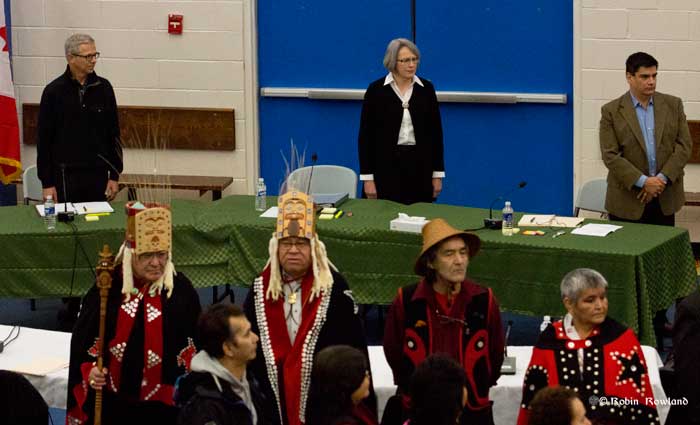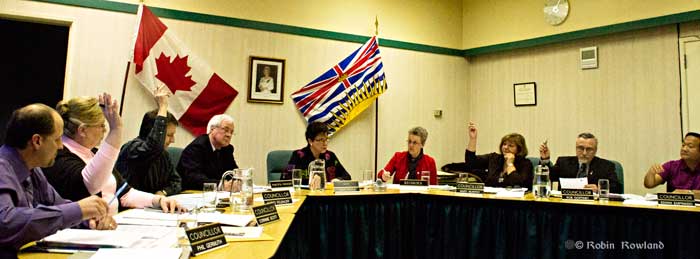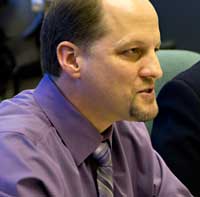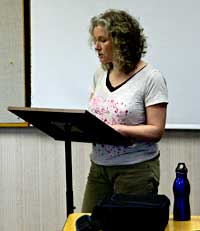The members of the Northern Gateway Joint Review panel and Stephen Harper’s cabinet, especially Natural Resources Minister Joe Oliver, should take a lesson from the Mother of Parliaments at Westminster and today’s parliamentary debate on the Leveson inquiry into the phone hacking scandal centered around Rupert Murdoch’s News International.
Fortunately for the United Kingdom, by and large, the House of Commons there still features rigorous debate by (mostly) intelligent Members of Parliament, unlike the current Parliament in Ottawa, where it appears that the members on the government benches are not even the “trained seals” they used to be, but mindless robots reading scripts prepared by operatives in the prime minister’s office.
(Although as the honourable Speaker at Westminster observed today, like Ottawa, debate can get out of hand at times. “Whatever strong views Members hold on this subject—as on many others—let me just remind them of the importance… of moderation in the use of language in this House. )
So what is the connection between Rupert Murdoch and the Northern Gateway Joint Review Panel? Simple. The debate in the UK House of Commons on Wednesday, April 25, 2012, was all about inappropriate political interference in a “quasi-judicial” proceeding.
In the case of the UK, we’re talking about inappropriate political interference in Rupert Murdoch’s application to own all of the the satellite broadcaster, BSkyB.
In Canada, we’re talking about the ongoing interference by Stephen Harper and Joe Oliver and other members of the Conservative cabinet in the proceedings of the Northern Gateway Joint Review Panel, which is also a quasi-judicial proceeding and should be independent of the government and should hear all sides of a debate, and come to a fair recommendation for the government.
Yet it is increasingly obvious, that up until now, the Joint Review Process is pre-determined to find the Enbridge Northern Gateway Pipeline in the “national interest” and even if the Joint Review Panel puts a large number of environmental restrictions and conditions on the pipeline, it is highly likely that the Harper cabinet will overrule those conditions. If the members and staff of the JRP read today’s UK Hansard, (See note on links below) perhaps it will give them some motivation and backbone to come up with an independent ruling and recommendation or if they can’t, they should do the honourable thing and resign.
So what happened in the UK? Yesterday’s testimony at the phone hacking inquiry by Lord Justice Brian Levenson showed that the UK Culture Secretary Jeremy Hunt had a series of meetings in the United States with News International executives prior to the Murdoch announcement that company was going to bid for full control of BSkyB. A special assistant to Hunt, a man named Adam Smith, also had meetings with News International officials and exchanged alleged “back channel” information. Smith has resigned. Hunt, for now, remains UK cultural secretary, with the Opposition demanding his head (not on London Bridge as a few centuries ago, just his resignation)
In a statement to the Commons, Hunt said
As part of this process, my officials and I have engaged with News Corporation and its representatives, as well as other interested parties—both supporters and opponents of the merger. Transcripts of conversations and texts published yesterday between my special adviser, Adam Smith, and a News Corporation representative have been alleged to indicate that there was a back channel through which News Corporation was able to influence my decisions. That is categorically not the case—[Interruption.]
Mr Speaker:
Order. The House must calm down a bit. The statement must be heard. There will be a full opportunity for questioning of the Secretary of State, as he would expect. Whether he expects it or not, that is what will happen. That is right and proper, but it is also right and proper that the statement should be heard with courtesy.
Mr Hunt:
However, the volume and tone of those communications were clearly not appropriate in a quasi-judicial process, and today Adam Smith has resigned as my special adviser. Although he accepts that he overstepped the mark on this occasion, I want to set on record that I believe that he did so unintentionally and did not believe that he was doing anything more than giving advice on process. I believe him to be someone of integrity and decency, and it is a matter of huge regret to me that this has happened.
So the volume and tone of communications between News International and the minister responsible for looking over the BskyB bid were “not appropriate.”
Here in Canada, Enbridge has been lobbying the Conservative government for years to tilt the process in their favour. As exposed by reporting by both PostMedia News and Canadian Press, Enbridge lobbying occurred just before the government pulled out of the PNCIMA– the Pacific North Coast Integrated Management Area, which was to safeguard the environment of the Pacific coast of BC.
At the same time the government continues to attack the other side, the environmentalists, as “radicals.” Hardly a fair approach.
Just today, Post Media News pointed to a report from the lobbying commission of a meeting between Enbridge and Fred Nott, chief of staff for the Minister of Fisheries and Oceans, and Pat Daniel, outgoing CEO of Enbridge, on Dec. 8, 2011 and now we have changes to the Fisheries Act that are clearly in Enbridge’s favour.
Back to the Mother of Parliaments. In response to Hunt, Harriet Harman of the Labour Party talked about ministers making up their minds on a major economic issue before a report is finished.
Everyone recognises that the £8 billion News Corp bid for BSkyB was of huge commercial importance and that it had profound implications for newspapers and for all of broadcasting, including the BBC. The Business Secretary had been stripped of his responsibility for deciding on the bid because he had already made up his mind against it, but the Culture Secretary too had made up his mind, in favour of the bid, so how could he have thought it proper to take on that decision? Of course he could take advice, but the decision as to whether he should do it, and could do it fairly, was a matter for him and him alone.
The Secretary of State took on the responsibility, and assured the House that he would be acting in a quasi-judicial role, like a judge, and that he would be transparent, impartial and fair. However, is it not the case that James Murdoch was receiving information in advance about what the Secretary of State was going to do and what he was going to say—information that was given to only one side, which had not been given to those who were opposed to the bid, and before it was given to this House…
When it comes to the transparency that the Secretary of State promised, there appears to have been a great deal of transparency for Murdoch, but precious little for opponents of the bid or for this House. If, as suggested on the right hon. Gentleman’s behalf in the media, he was negotiating with Murdoch, why did he not tell the opponents of the bid and why did he not tell the House? Will he tell us now whether he believed himself to have been negotiating? Is that what was going on?
Chris Bryant, Labour member for Rhondda, could perhaps give the Canadian House of Commons, or at least the Canadian Conservative members, a lesson in the meaning of “quasi-judicial.”
Chris Bryant
Every councillor in the land knows what “quasi-judicial” means. They know that it means that if they are on the planning committee, they cannot tip the wink to anybody on one side or the other, and that they have to be cleaner than clean, whiter than white.
In the United Kingdom, as in Canadian Parliament, the underlinings take the fall for the Minister, but in a quote widely reprinted in the media today, one honourable member from the UK objecting to the minister’s action put it much better than anyone in Canada.
Mr Dennis Skinner (Bolsover) (Lab):
The Culture Secretary’s adviser has now lost his job. Does that not prove the theory that when posh boys are in trouble, they sack the servants? Why doesn’t the Secretary of State do the decent thing: tell dodgy Dave and Gideon, and get out and resign?
Mr Hunt:
Adam Smith’s resignation is a matter of huge regret to me. I believe him to be a person of integrity and decency, but my responsibility to this House is to the integrity of this process—the objectivity and impartiality with which this process was conducted—and I believe I have presented evidence to the House that demonstrates that I behaved in a judiciously impartial way throughout.
One other key difference between the House of Commons in Ottawa and the House of Commons at Westminster is that the Speaker actually tries to get ministers to answer the questions put to them by the Oppositon and also comes down hard on irrelevancies.
Mr Speaker:
Order. The hon. Gentleman is asking a question that is completely irrelevant to the terms of the statement. [Interruption.] It is simply not relevant. The hon. Gentleman should go and do his homework.
Jeremy Hunt asked to testify before the Leveson inquiry to tell his side of the story, so to be fair, until he has completed his testimony, the public will not know all that transpired between the Murdoch’s News International and the Conservative government in the UK.
It also should be noted that Hunt had a dual role, both as a cabinet minister and the quasi-judicial action of deciding on the BskyB application, which certainly seems to be a conflict of interest, while the Joint Review Panel is made up of three nominally independent individuals.
However, the fact remains, that statements from Stephen Harper, Joe Oliver and Peter Kent, with their open support for the Enbridge Northern Gatway pipeline while the JRP proceedings continue, are in the words of a much more honourable member than they are: “the volume and tone of those communications were clearly not appropriate in a quasi-judicial process.”
This also means that Canadians, especially the people of British Columbia, and the national media, should, from now on, be paying closer attention to the Leveson Inquiry. As of this week, the inquiry goes beyond the Shakespearean nature of the Murdoch clan, the titillation of the scandal of hacking the phones of Royals, celebrities, footballers and murder victims, not to mention the excesses of the British tabloids. Political interference in supposedly independent quasi-judicial proceedings is a threat to the checks and balances of any democracy and we should watch the testimony in London and be on guard for the future of Canada’s already shaky democracy.
Hansard Links
I have taken the debate from Today’s Debates. It does not yet appear on the main menu
After April 25, you can search UK debates by date
Official site: Leveson Inquiry Culture, Practice and Ethics of the Press










